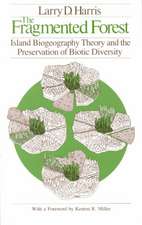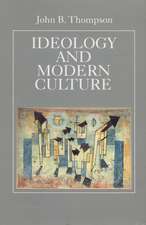Relentless Evolution
Autor John N. Thompsonen Limba Engleză Paperback – 12 apr 2013
At a glance, most species seem adapted to the environment in which they live. Yet species relentlessly evolve, and populations within species evolve in different ways. Evolution, as it turns out, is much more dynamic than biologists realized just a few decades ago.
In Relentless Evolution, John N. Thompson explores why adaptive evolution never ceases and why natural selection acts on species in so many different ways. Thompson presents a view of life in which ongoing evolution is essential and inevitable. Each chapter focuses on one of the major problems in adaptive evolution: How fast is evolution? How strong is natural selection? How do species co-opt the genomes of other species as they adapt? Why does adaptive evolution sometimes lead to more, rather than less, genetic variation within populations? How does the process of adaptation drive the evolution of new species? How does coevolution among species continually reshape the web of life? And, more generally, how are our views of adaptive evolution changing?
Relentless Evolution draws on studies of all the major forms of life—from microbes that evolve in microcosms within a few weeks to plants and animals that sometimes evolve in detectable ways within a few decades. It shows evolution not as a slow and stately process, but rather as a continual and sometimes frenetic process that favors yet more evolutionary change.
Preț: 342.54 lei
Nou
Puncte Express: 514
Preț estimativ în valută:
65.55€ • 68.19$ • 54.12£
65.55€ • 68.19$ • 54.12£
Carte tipărită la comandă
Livrare economică 14-28 aprilie
Preluare comenzi: 021 569.72.76
Specificații
ISBN-13: 9780226018751
ISBN-10: 022601875X
Pagini: 512
Ilustrații: 64 halftones, 25 line drawings, 4 tables
Dimensiuni: 152 x 229 x 33 mm
Greutate: 0.68 kg
Editura: University of Chicago Press
Colecția University of Chicago Press
ISBN-10: 022601875X
Pagini: 512
Ilustrații: 64 halftones, 25 line drawings, 4 tables
Dimensiuni: 152 x 229 x 33 mm
Greutate: 0.68 kg
Editura: University of Chicago Press
Colecția University of Chicago Press
Notă biografică
John N. Thompson is Distinguished Professor of Ecology and Evolutionary Biology at the University of California, Santa Cruz. Among his previous books are The Coevolutionary Process and The Geographic Mosaic of Coevolution, both published by the University of Chicago Press.
Cuprins
Preface
Part I. The Process of Adaptation
Chapter 1. Adaptive Evolution
Chapter 2. Natural Selection
Part II. The Ecological Genetics of Adaptation
Chapter 3. Genes
Chapter 4. Genomes
Chapter 5. Coevolving Genomes
Chapter 6. Conflicting Genomes
Part III. Variable Selection and Adaptation
Chapter 7. Adaptive Variation
Chapter 8. Recombination and Reproduction
Chapter 9. Divergence and Selection across Environments
Chapter 10. Local Adaptation
Part IV. The Dynamics of Coadaptation
Chapter 11. Coevolutionary Dynamics
Chapter 12. The Geography of Traits and Outcomes
Chapter 13. Experimental Evolution
Part V. Diversification
Chapter 14. Ecological Speciation
Chapter 15. Reticulate Diversification
Chapter 16. Species Interactions and Adaptive Radiations
Chapter 17. The Web of Life
Part VI. Synthesis
Chapter 18. Our Changing Perceptions
Chapter 19. Conclusions
Literature Cited
Index
Part I. The Process of Adaptation
Chapter 1. Adaptive Evolution
Chapter 2. Natural Selection
Part II. The Ecological Genetics of Adaptation
Chapter 3. Genes
Chapter 4. Genomes
Chapter 5. Coevolving Genomes
Chapter 6. Conflicting Genomes
Part III. Variable Selection and Adaptation
Chapter 7. Adaptive Variation
Chapter 8. Recombination and Reproduction
Chapter 9. Divergence and Selection across Environments
Chapter 10. Local Adaptation
Part IV. The Dynamics of Coadaptation
Chapter 11. Coevolutionary Dynamics
Chapter 12. The Geography of Traits and Outcomes
Chapter 13. Experimental Evolution
Part V. Diversification
Chapter 14. Ecological Speciation
Chapter 15. Reticulate Diversification
Chapter 16. Species Interactions and Adaptive Radiations
Chapter 17. The Web of Life
Part VI. Synthesis
Chapter 18. Our Changing Perceptions
Chapter 19. Conclusions
Literature Cited
Index
Recenzii
“Thompson is an authoritative writer. . . . [H]is latest book addresses much the same major questions as its predecessors, and yet it is timely and distinctive because Thompson’s way of thinking, as with the subject of his analysis, evolves and diversifies rapidly through time. The book continues an unfolding story that becomes richer and more appealing as more evidence is compiled. Thompson’s discussions confirm previous ideas but at the same time channel them toward novel and richer directions. They will also serve to remind young scientists that this is a great time to be conducting research on evolution. Timely, authoritative, and beautifully told, Relentless Evolution is a must read for anyone interested in understanding the processes shaping life on Earth.”
“The breadth and depth of scholarship covered in Relentless Evolution will make it especially valuable for any beginning graduate student surveying the field for a niche in which to develop a dissertation. However, the book should be of interest to anyone—from research faculty to informed non-scientists—looking for a survey of the current state of evolutionary ecology and the historical origins of key concepts.”
“A valuable and accessible resource for anyone with a basic interest in evolution and ecology, including graduate students, faculty, and engaged nonscientists.”
“Thompson has been a major figure in evolutionary ecology for more than three decades and is a leading authority on the coevolution of interacting species. . . . [T]his new—and I think his best—book is a grand synthesis with a majestic sweep, drawing on about 1800 literature references that range from population genetics and genome evolution to community and ecosystem ecology.”
“In his ambitious new book, Relentless Evolution, John Thompson painstakingly details the case that evolutionary change happens rapidly, and that evolution profoundly affects interactions between species. . . . Thompson’s new book compiles an almost encyclopedic collection of examples where rapid evolutionary change has been observed, and presents a compelling case that these changes are important in a broad array of fields, none more so than ecology. Although the book is primarily intended for an academic audience, educators and science enthusiasts will appreciate his review of the theory of natural selection and his extensive compilation of case studies in contemporary evolution.”
“A landmark book in that it brings attention to the diversity of evolutionary processes and shows how animals, plants, and bacteria are affected and how they affect other organisms around them. . . . This book will tantalize many biologists, geneticists, and others seeking to understand how species arise and change. Highly recommended.”
“Relentless Evolution is a masterful synthesis of scientific fields that are expanding at astonishing speed. Surveying research as varied as lab experiments on bacteria to millions of years of coevolution between insects and flowers, John N. Thompson provides readers with a twenty-first-century view of evolutionary change, unfolding all around us and shaping our world.”
“Relentless Evolution is a classic John Thompson book—erudite, highly readable, hugely broad in the examples it weaves together, and full of interesting perspectives. Thompson continues his thinking about evolution and coevolution, developing an overall argument for the importance of the never-ending reciprocal relationships between interacting elements as a major component responsible for the diversity of life. The book provides tremendous insights into the complexity of communities and ecosystems and the need to see them as ever-changing entities for which there is no starting point or finishing line. It will be a very valuable addition to the literature.”
“In a world of relentless environmental change, occurring at a rate unprecedented in human history, the issue of the speed of evolutionary adaptation has taken on great significance. Which species and populations will be able to adapt and continue to deliver natural services to humanity? What rates of change will still make adaptation possible and maintain ecosystem functioning? We know that evolution is not the gradual process once imagined, and that natural selection can act very quickly, but when, where, and how will evolution be fast enough to help civilization to survive? Relentless Evolution, written by a distinguished evolutionary biologist, brilliantly provides the scientific background against which these and related questions can be addressed. Everyone who cares about the environment will want it on their shelf.”













